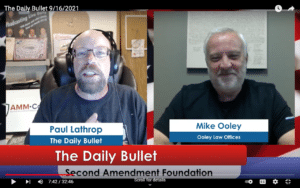An armed citizen who carries a trauma kit justifiably shoots an assailant, then calls 9-1-1. From a legal defense viewpoint, what are the possible benefits and risks of treating the gunshot wound while waiting for the first responders?
You have just survived the moment you had hoped you would never experience. You had to use deadly force to defend yourself or another innocent person against a violent attack.
Should you provide first aid to the person that just attacked you? The decision is not one to be taken lightly as there are a number of practical and legal considerations. From a practical standpoint, it will probably not be prudent or safe to render aid, but in a scenario where the scene is secure, and you can safely administer first aid, what legal ramifications might there be? For more discussion regarding the practical considerations, check out Massad Ayoob’s comments: https://www.youtube.com/watch?v=xRyhocMdJLM.
As is the case in most states, you have no legal duty to provide aid in Indiana (Ind. Code §34-30-12-1). However, some states do have an affirmative duty to provide aid. The duty may only require that you summon aid by calling 9-1-1. See, e.g., Minn. Stat. § 604A.01. This article has a breakdown of states that create an affirmative duty and states that do not: http://tmsnrt.rs/1Df3U7T.
If you decide it is safe and you are capable of rendering aid, most states have some type of “good Samaritan” law. These laws vary but generally provide civil immunity for someone who makes an error while rendering emergency medical care. That is, he or she cannot be held legally liable for damages in court. These statutes typically have three requirements:
- The aid must be given at the scene of the emergency,
- In good faith, and
- Gratuitously, without the expectation of monetary gain.
You will find those same three elements with slightly different wording in the Indiana “good Samaritan” statute which states:
“a person who comes upon the scene of an emergency or accident…or is summoned to the scene of an emergency or accident and, in good faith, gratuitously renders emergency care at the scene of the emergency or accident is immune from civil liability for any personal injury that results from: (1) any act or omission by the person in rendering the emergency care; or (2) any act or failure to act to provide or arrange for further medical treatment or care for the injured person; except for acts or omissions amounting to gross negligence or willful or wanton misconduct.” (Ind. Code § 34-30-12-1) (emphasis added).
In regards to the exceptions noted in the statute, if the aid is rendered in a way that constitutes gross negligence or willful or wanton misconduct, then there will be no immunity. Gross negligence as it originally appeared, was very great negligence. It has been described as a failure to exercise even that care which a careless person would use. Most courts consider that “gross negligence” falls short of a reckless disregard of the consequences, and differs from ordinary negligence only in degree, and not in kind. W. Page Keeton et al., Prosser and Keeton on the Law of Torts § 34, at 211–12 (5th ed. 1984).
Indiana has no case law interpreting the application of the good Samaritan statute to a self-defense scenario. As a matter of fact, there is not much case law anywhere. However, while Indiana has little guidance on the good Samaritan statute in the self-defense context, our best guess is that as long as you satisfy the elements of the good Samaritan law in Indiana, the courts are likely to treat the person who defended oneself in self defense like they would treat an innocent bystander, making you immune from civil liability if you decide to render aid in a way that is not grossly negligent.
Nonetheless, there are some other considerations, particularly from a criminal law standpoint that one must consider. For instance, how will rendering aid look to a jury? Will it help your case or hurt your case? On one hand, some jurors will see rendering aid as the morally correct course of action. On the other hand, some jurors may see your attempt to render first aid as a sign of guilt. They might think you are trying to save the perpetrator because of some mistake you made when you decided to shoot.
Another important aspect to consider from a legal perspective is the preservation of evidence. A potential negative implication from rendering aid is that you will have directly participated in changing or eliminating evidence at the scene such as body position, wound condition, clothing damage or alteration, weapon location, or any myriad of other pieces of evidence that might be critical to the investigation of your self-defense act. Although this will likely occur when professional medical help arrives, at least your motivations will not be attacked as you will not be a direct participant in altering the evidence.
Whatever the situation, you need to be able to articulate why you did what you did to your defense team so that they can educate authorities and potentially a jury. Please remember that the laws will vary depending upon your jurisdiction (refer to http://tmsnrt.rs/1Df3U7T). The key is to visualize these scenarios ahead of time so that you will be more prepared to respond if you have to act in self-defense.
Originally published at https://armedcitizensnetwork.org/en/june-2017-attorney-question





